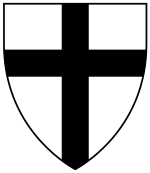


The Treaty of Christburg - 1249
The Treaty of Christburg was a peace treaty signed on February
2, 1249 between the pagan Prussian clans, represented by a papal legate, and the Teutonic Knights. It is often cited as the
end of the First Prussian Uprising, but it was not adhered to or enforced, especially after the Battle of Krücken in
November of 1249, where Prussians massacred and tortured to death 54 knights who had surrendered. The treaty guaranteed personal
rights to all Prussians who converted to Christianity, but it did nothing to establish peace as many Prussians did not wish
to convert and the Knights swore to root out paganism. It is one of the few documents from the period that survive in full
to this day. It provides a useful insight into the life and religious tensions in pagan Prussia. It also offers a small glimpse
into the Prussian mythology and traditions. In 1230 the Teutonic Knights, a Roman Catholic religious order, settled in the Chełmno Land
and began their crusade against the pagan Prussians. By 1241 five of the seven major Prussian clans had surrendered to the
Knights. Then the First Uprising broke out. Prussians forged an alliance with Świętopełk II of Pomerania, a
Polish duke who quarreled with the knights over the succession in Pomerania. At first the rebels were successful, and the
Knights were reduced to just five of their strongest castles. However, Świętopełk lost several battles and
was forced to make peace. Substantial reinforcements, encouraged by the pope, arrived from Germany to help the Knights and
eventually the uprising was subdued.

By 1246, Pope Innocent IV
had appointed his chaplain, Jacob of Liège, the future Pope Urban IV, to mediate in the conflict and produce a peace
treaty. However, he was not able to achieve much until 1248. In September, Świętopełk agreed to a truce and
signed the final peace treaty on November 24, 1248. The Prussians, left without their greatest supporter, had to agree to
negotiations. Since the pope considered himself to be the suzerain of the Prussians, his legate signed the treaty in his name
and that of the Prussians. Although only Pomesanians agreed to the treaty, it was also signed in the name of the Warmians
and the Natangians.

The treaty was signed in Christburg
(now Dzierzgoń) which the Knights built on the site of a major Pomesanian fortress that they had captured on the Christmas
Eve of 1247.The preamble emphasized that the Teutonic Knights had broken their promises to previous popes to respect the newly
converted locals and guarantee their freedom. The treaty did not address the political situation, but only guaranteed personal
rights of the converts and demanded they embrace Christianity. They could inherit, acquire, and exchange real and personal
property. Sales of real estate were possible only between people of the same nationality, but the Knights were entitled to
a portion of the proceeds. This provision tried to prevent the seller escaping to the enemies. Property could be bequeathed
not only to sons, as before, but also to daughters and other relatives.

The amount of attention paid to
property rights suggests that the Knights were often violating them. The converts were also promised opportunities to become
priests or monks, and those of noble origins could even hope at becoming a knight, a real brother of the Teutonic Knights.
Converts also had a right to sue and be sued in the secular and religious courts according to Polish law. The rights were
guaranteed only as long as the person observed Christian rites and had not committed a sin, which provided sufficient possibility
of abuse by the Knights. Prussians were forbidden to wed to more than
one wife, and only a marriage with a proper Christian ceremony at a church was legal. Selling or buying women in marriage
was forbidden as was marrying stepmothers, sisters-in-law, or wives of deceased relatives within four generations. Some other
pagan rituals were expressively forbidden: worship of Curche, the god of harvest and grain; maintaining pagan priests (Tulissones
vel Ligaschones), who performed certain rituals at funerals; cremation of the dead with horses, persons, arms, or any other
property. The Prussians were required to build and supply with land, livestock, and other necessities thirteen churches in
Pomesania, six in Warmia, and three in Natangia within half a year. The churches were to be so beautiful that pagans would
rather pray inside them than in the forests. Prussians were also required to pay an annual tithe in grain and participate
in the Teutonic campaigns armed with their own weapons and provided with their own food. Alliances against the Knights were
forbidden. As the treaty did not address the needs of those who did
not wish to convert, and fighting soon broke out again. In November of 1249, the Teutonic Knights suffered a great defeat
at Krücken, which earned Prussians the reputation as an uncivilized people with no honor. Further fighting followed and
Świętopełk offered his help. War ended in 1253, and some cite this date as the end of the First Uprising. The
treaty was then superseded and remained only as an interesting historical document
